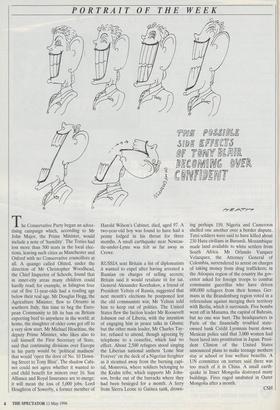PORTRAIT OF THE WEEK
The Conservative Party began an adver- tising campaign which, according to Mr John Major, the Prime Minister, would include a note of 'humility'. The Tories had lost more than 500 seats in the local elec- tions, leaving such cities as Manchester and Oxford with no Conservative councillors at all. A quango called Ofsted, under the direction of Mr Christopher Woodhead, the Chief Inspector of Schools, found that in inner-city areas many children could hardly read; for example, in Islington four out of five 11-year-olds had a reading age below their real age. Mr Douglas Hogg, the Agriculture Minister, flew to Otranto in southern Italy, this time to beg the Euro- pean Community to lift its ban on Britain exporting beef to anywhere in the world; at home, the slaughter of older cows got off to a very slow start. Mr Michael Heseltine, the deputy Prime Minister, who likes also to call himself the First Secretary of State, said that continuing divisions over Europe in his party would be 'political madness' that would 'open the door of No. 10 Down- ing Street to Tony Blair'. The shadow Cabi- net could not agree whether it wanted to end child benefit for minors over 16. Sun Alliance and Royal Insurance are to merge; it will mean the loss of 5,000 jobs. Lord Houghton of Sowerby, a former member of Harold Wilson's Cabinet, died, aged 97. A two-year-old boy was found to have had a penny lodged in his throat for three months. A small earthquake near Newcas- tle-under-Lyme was felt as far away as Crewe.
RUSSIA sent Britain a list of diplomatists it wanted to expel after having arrested a Russian on charges of selling secrets; Britain said it would retaliate tit for tat. General Alexander Korzhakov, a friend of President Yeltsin of Russia, suggested that next month's elections be postponed lest the old communists win; Mr Yeltsin told him to keep out of politics. The United States flew the faction leader Mr Roosevelt Johnson out of Liberia, with the intention of engaging him in peace talks in Ghana; but the other main leader, Mr Charles Tay- lor, refused to attend, though agreeing by telephone to a ceasefire, which had no effect. About 2,500 refugees stood singing the Liberian national anthem 'Lone Star Forever' on the deck of a Nigerian freighter as it steamed away from the burning capi- tal, Monrovia, where soldiers belonging to the Krahn tribe, which supports Mr John- son, broke out of the barracks where they had been besieged for a month. A ferry from Sierra Leone to Guinea sank, drown- ing perhaps 150. Nigeria and Cameroon shelled one another over a border dispute. Tutsi soldiers were said to have killed about 230 Hutu civilians in Burundi. Mozambique made land available to white settlers from South Africa. Mr Orlando Vazquez Velazquez, the Attorney General of Colombia, surrendered to arrest on charges of taking money from drug traffickers; in the Atioquia region of the country the gov- ernor asked for foreign troops to combat communist guerrillas who have driven 600,000 refugees from their homes. Ger- mans in the Brandenburg region voted in a referendum against merging their territory with Berlin, which it surrounds. Five bombs went off in Manama, the capital of Bahrain, but no one was hurt. The headquarters in Paris of the financially troubled state- owned bank Credit Lyonnais burnt down. Mexican police said that 3,000 women had been lured into prostitution in Japan. Presi- dent Clinton of the United States announced plans to make teenage mothers stay at school or lose welfare benefits. A UN committee on torture said there was too much of it in China. A small earth- quake in Inner Mongolia destroyed many buildings. Fires raged unabated in Outer Mongolia after a month.
CSH


































































 Previous page
Previous page